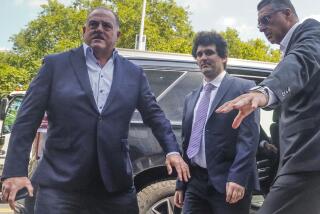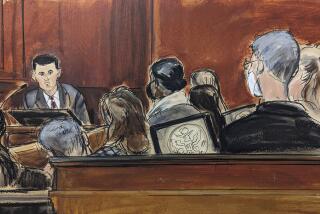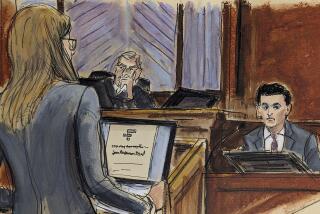Keating Lawyer Says Fraud Case Is Built on Inference
- Share via
LOS ANGELES — Charles H. Keating Jr.’s lawyer characterized the state’s securities fraud case against his client Friday as a “hodgepodge of circumstantial evidence” that relies on speculation and “inference piled on inference.”
In his closing argument, defense lawyer Stephen C. Neal told jurors that prosecutors failed to present any evidence that Keating knew of any false statements or omissions of material information in the sale of his company’s bonds through branches of Irvine-based Lincoln Savings & Loan.
He also asserted that no evidence was presented during the nine-week trial to show that Keating, the former chairman of Lincoln’s parent company, American Continental Corp., intended to deceive bondholders or took any actions to aid in deceiving them.
The prosecution’s “whole case is that Charlie Keating controlled the flow of information” and that he therefore “must have known” about misrepresentations, Neal said.
But Keating did not control the entire flow of information, especially when it came to bond sales, Neal said. The lawyer cited former Lincoln President Ray C. Fidel’s testimony that Fidel relied on lawyers, not Keating, in directing what information was to be included in the bond sales brochures and sales pitches.
Meantime, outside the courtroom after the morning session, a small group of angry bondholders risked a mistrial when they gathered before cameras and loudly berated Neal’s arguments as a number of jurors walked by.
“I’m so angry I could spit tacks and build houses,” seethed bondholder Jeri Mellon of Sherman Oaks.
Los Angeles Superior Court Judge Lance A. Ito spent the first 45 minutes of the afternoon session questioning several jurors in private on what they saw and heard and whether it would influence their deliberations. Final arguments continued after he was satisfied that the jurors weren’t prejudiced by the outburst.
In his summation, Neal also put on trial the very laws that the company used to sell more than $250 million in bonds. He pointed out that the company followed the law in every respect, including a prohibition on using licensed brokers to sell the bonds.
If guidelines to bondholders were followed, he said, customers would have known that the bonds were risky, uninsured, unsecured investments that should not be sold to anyone who couldn’t afford to lose money.
“All ACC did was follow the law,” the defense attorney said.
Neal noted that the prosecution had subtly changed its position that Keating failed to disclose material information to a contention that Keating failed to make adequate disclosures.
Neal also called into question the roles and motives of thrift regulators, who often were caught in contradictory statements. He hinted that the bitter relationship between regulators and Keating might have begun when a federal examiner let a Lincoln executive know that his superiors were forcing him to redo an examination until he found something negative.
Neal asked jurors to “send a message” with an acquittal verdict that more evidence is needed and that regulators should be investigated. But Deputy Dist. Atty. William Hodgman asked them to “tell the defendant he is responsible” and the “time has come for him to acknowledge” his crimes.
In a short rebuttal Friday, Hodgman argued that the testimony of regulators put Keating on notice that they had serious concerns about the financial stability of Lincoln and American Continental, and those concerns weren’t passed on to bond buyers.
The disclosures were inadequate, Hodgman said, because no average person could read and understand the legal jargon used in the prospectus--which, by law, is the only document that buyers are supposed to rely on for information about a company. Nor could customers understand other securities and legal documents that were part of the bond package given to prospective buyers, he said.
“It’s the totality of the evidence that counts,” he told the jurors. “Knowing what you know now, would you buy an ACC subordinated debenture (bond)?”
He urged them not to leave their common sense at the door of the jury deliberation room and to follow the path of circumstantial evidence to find Keating guilty on 18 counts of defrauding small investors. The investors lost their money after Keating’s empire collapsed in April, 1989.
Keating faces a maximum penalty of 10 years in prison and a $250,000 fine.
The arguments by Neal on Friday and Hodgman on Thursday prompted Judge Ito to comment, after jurors left the courtroom: “Thank you, gentlemen. That was very entertaining.”
Ito will instruct jurors Monday on the law that applies to the case, and they will begin deliberations.
More to Read
Inside the business of entertainment
The Wide Shot brings you news, analysis and insights on everything from streaming wars to production — and what it all means for the future.
You may occasionally receive promotional content from the Los Angeles Times.










